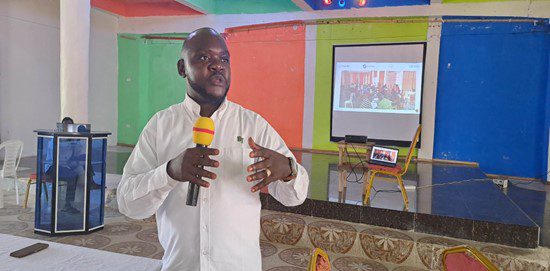In most developing economies, the media suffers from a myriad of challenges –especially during and after a global pandemic like COVID-19. From a hike in operational costs to a dive in advertising sales resulting from shrinking business activities, the media struggles to keep afloat – leaving room for political actors to set their agenda through the media, which can negatively influence media independence.

In Liberia, Internews is working with local media partners to enhance their financial and technical sustainability. To achieve this, the USAID Media Activity Project has designed many business support activities to improve the business standing of media houses. One of the strategies is to increase private sector interactions with Internews’ network of community radio stations, including non-project partners.
As part of the 2023 World Radio Day celebrations, a private sector and media leaders’ engagement forum held in Ganta, Nimba County, was utilized to unveil the potential of the community radio sector as a niche for private businesses to consider in promoting their goods and services to attract new clients and expand their market penetration through a chain of radio stations across the country.
As a result of the forum, Arcelor Mittal, Liberia’s Corporate Communications Manager, Winston Daryoue, reiterated his company’s commitment to supporting the Liberian media through business activities by mainly targeting radio stations in the company’s operational counties of Nimba and Grand Bassa. Goambei E. Zeyoe from the United Bank Africa (UBA)-Liberia[2] also expressed similar willingness to support select community radio stations through special projects in fulfillment of the bank’s corporate social intervention in Liberia. This is welcome news for local media given the challenging economic environment they operate in and the need for developing a sustainable business model for their operations. In his response, the Station Manager of Radio Gbarnga, Marcus Malayea, said “The assurance from Arcelor Mittal that it would be increasing its volume of business transactions with radio stations, especially those in its concession area is a great development towards the financial viability of the local media”. He maintained that the media would prefer direct transactions with them rather than through a third party.
To strengthen the financial viability of the local media and enhance their independence, Internews will provide small financial grants – through a competitive scheme – to five radio stations. This is in addition to working with the radio stations in developing viable business plans and providing targeted mentoring for the successful roll-out of the plans.

The private sector engagement forum also included a session on how to keep radio stations on air through alternative energy sourcing. This is against the backdrop of a 2020 nationwide radio assessment by Internews that revealed 45% of radio stations get electricity from generators they operate while 22% and 12% get electricity from Orange GSM and Lonestar MTN, respectively (two telecom service providers in Liberia with towers erected across the country – some closer to radio stations that serve as a source of power supply to the radios).
The forum provided an opportunity for a direct interface between radio partners and the private sector on a more viable and sustainable energy generation and utilization. Given the challenges that radio stations face in accessing power and the importance of investing in solar energy, especially for rural radio stations with limited income-generating opportunities, two representatives from a solar energy company and a radio equipment sales company made presentations on the different products and services they offer. Discussions focused on potential terms of payment for products and services, considering most media outlets could not outrightly afford the full prices charged by these companies.


“It’s no secret that electricity is the biggest challenge facing community radios, and this is why the assurance from the solar energy companies is very welcome. Alternative energy sourcing is the best option if our radios must stay on air. However, we hope the solar companies can develop tailored packages for the media. As good as their offer is, how many radio stations can afford an upfront advance payment? Not a single community radio station here in Liberia can afford that. So, maybe the solar companies can give us the service on credit, then we make payment through advertising services. That way, we help each other achieve our social mission and business goals.” Moore Tuah – Station manager, Radio Karn Voice of Peace.
Moore Tuah – Station manager, Radio Karn Voice of Peace, on alternative energy sourcing funding proposals
While opportunities remain for partnership with the private sector to respond to the energy and financial needs of local radios, concerns remain over the disruption of the operations of radio stations with the relocation of some towers of GSM companies (Mobile telecommunications) who have been providing steady power supply to some radio stations. The over-reliance on power supply from GSM companies means that 79% of all radios stations in Liberia would have to switch to generators or invest in solar energy if all GSM companies relocate their towers. This grim scenario underscores the urgency and importance of supporting local radio stations in media sustainability that would enhance their operations and secure their long-term independence.